Draper Hills Summer Fellows Class of 2015
Draper Hills Summer Fellows Class of 2015
Listed below are the public profiles for the 2015 class of Draper Hills Summer Fellows

Silvina Rivarola
Argentina
Silvina Rivarola is a criminal prosecutor and head of the cyber crime unit with the Attorney General’s Office for the City of Buenos Aires. Rivarola conducts investigations, gathers evidence and prosecutes criminal offenses concerning child pornography, illegal access, illegal interception and damages due to cyber attacks.
Rivarola has devoted her 25-year career to advancing the rule of law in Argentina’s judicial branch. She previously served as a criminal judge for cases concerning fraud, sexual assaults and robberies. In an effort to improve the judicial system in Argentina, she co-organizes an annual academic program in London bringing together Argentine judges, lawyers and prosecutors to learn best practices from Britain.
Rivarola holds a master’s degree in international relations from the University of Belgrano and a master’s degree in judiciary and judicial law from Austral University, Argentina. She received a law degree from the University of Buenos Aires.
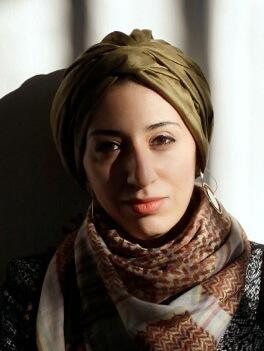
Ala’a Shehabi
Bahrain
Ala’a Shehabi is civil rights activist and a senior researcher for the University of Lancaster’s Work Foundation, a non-profit organization providing analysis and policy recommendations in the U.K. She is the co-founder of Bahrain Watch, a watchdog group that carries out investigations into state policies to promote transparency and accountability. Bahrain Watch has led evidence-based research investigations focused on state surveillance, political reform, media and information control, policing, arms and security.
Previously, Shehabi worked as an economics lecturer at the Bahrain Institute of Banking and Finance and was a social policy analyst at the RAND Corporation. Since then, she has been an independent researcher with fellowships at Brown University, Lund University, and the Arab Council for Social Sciences. She engages in collaborative research projects that connect to the democratic struggle in Bahrain.
Shehabi is co-editor of Bahrain's Uprising by Zed Books, London. She is also a member of the Road Bloc Collective, which is organizing an art exhibition as part of London’s annual Shubbak Festival in July 2015.

Aleś Łahviniec
Belarus
Aleś Łahviniec is the vice-chair of Movement for Freedom, one of Belarus’ leading democratic opposition organizations working to advance democracy and develop civil society. He also serves as the director of Movement for Freedom’s annual school on democracy and modernization.
Łahviniec is an aspiring politician who has run for parliamentary and local elections. As an instructor, he is leading several education programs for young people. He is also a political commentator in Belarusian independent media. Łahviniec was the recipient of the Europe Award from the Heinz-Schwarzkopf Foundation "Young Europe" in 2007 and the 2012 Leŭ Sapieha Award Winner from a consortium of five Polish universities under the support of the President of Poland.
Łahviniec received an M.A in political science from the Institute for Political Science, France, and a diploma from the Polish Diplomatic Academy, Poland.

Thinley Choden
Bhutan
Thinley Choden is an independent consultant, social entrepreneur and advocate for education and women’s leadership. She founded READ Bhutan in 2008, the first organization to establish a network of community libraries and resource centers in rural areas of the country. READ programs serve over 35,000 Bhutanese and helps to instill democratic practices on a grassroots level.
Previously, Choden served as a program officer for the United Nations World Food Program (UNWFP). In Bhutan, she managed the Food for Education program for UNWFP, and in New York she served as a liaison assistant covering General Assembly and Security Council. Before going to graduate school, Choden founded and managed a travel company based in Bhutan. She also collaborated with American filmmakers to produce an Emmy award-winning documentary on Bhutan, which aired on PBS in the United States.
Choden received an executive education certificate in strategic decision-making from Wharton Business School and a master’s degree in public administration from University of Hawaii as an East-West Center degree fellow. She also received a postgraduate certificate from the Asia Pacific Leadership Program at the East-West Center and a bachelor’s degree in economics from Beloit College in Wisconsin.

Sumeja Tulic
Bosnia and Herzegovina
Sumeja Tulic is a researcher for Amnesty International responsible for monitoring, researching, investigating and analyzing human rights developments for Bosnia and Herzegovina, Croatia and Slovenia. Her work focuses on access to justice for victims of war crimes.
As an activist in the Balkans, Tulic helped launch networks to combat hate crimes and speech. She used photography as a tool for human rights outreach. Previously, Tulic served as a program officer at Civil Rights Defenders where she worked with human rights defenders from Serbia and Bosnia on issues relating to discrimination, rule of law and transitional justice. In 2014, Tulic became the first Bosnian to receive the Magnum Foundation and New York University’s Human Rights and Photography Fellowship.
Tulic holds a B.A. in law education from the University in Sarajevo and an M.A. in human rights and democracy in southeastern Europe from the University of Sarajevo and the University of Bologna.
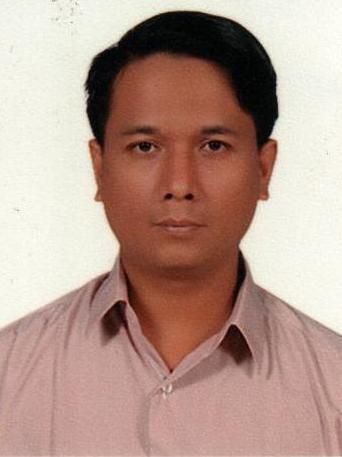
Myat Ko
Burma
Myat Ko is the co-founder of the Yangon School of Political Science where he directs the school’s political education department working to train and empower citizens with knowledge to support Burma’s political development. In 2012, he participated in an election observation process held under the Yangon School.
Ko works with ethnic groups and opposition parties to engage them in Burma’s transition. He was imprisoned from 1998-2004 for his activism. Following his release seven years later, he resumed his work as an underground human rights activist documenting violations.
In 2014, Ko was selected as a Charles Wallace Trust Research Fellow at Oxford University where he contributed to the debate around democracy, national reconciliation and peace in Burma with a final paper titled “Federalism and Burma.”
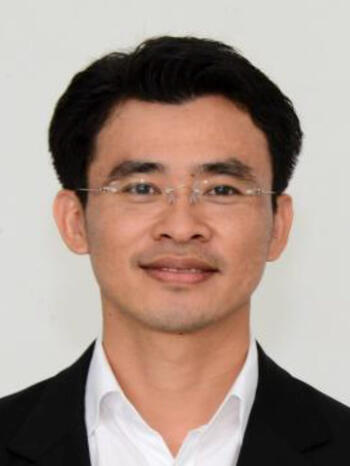
Terith Chy
Cambodia
Terith Chy is the executive officer of the Documentation Center of Cambodia, an organization that documents the crimes committed by the Khmer Rouge regime to help bring justice to the millions of victims and survivors. His work in the transitional justice process has made him one of Asia’s leading experts on victim participation in mass crimes proceedings.
Chy has informed thousands of victims and survivors on their rights to proceedings and updates by the Extraordinary Chambers in the Courts of Cambodia (ECCC), a court established to try senior members of the Khmer Rouge for violations of international law during the Cambodian genocide. His team has assisted over 1,500 survivors to submit accounts of their suffering to the ECCC Victims Section. Chy’s recent monograph, When the Criminal Laughs, explores the complex relationship between victim and perpetrator through war crimes trials in Cambodia.
He was selected as a 2015 development fellow for the Asia Foundation’s Emerging Leadership for Asia's Future program. He holds a bachelor’s degree in law from the Royal University of Law and Economics and a bachelor’s degree from Norton University in Cambodia. Chy received a master’s degree in criminology from the University of Hull, England, and a master of law degree from the University of Hong Kong.
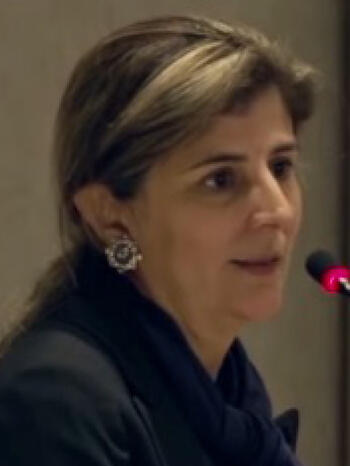
Laura Gil
Colombia
Laura Gil is a senior advisor to the Minister of Interior in Colombia where she has worked on drafting and implementing a law to support the peace process and reparations for victims. Working with government and civil society, Gil has sought government action to aid in the peaceful resolution of internal armed conflicts.
Previously, Gil directed Alianza Colombia sin Heridas, a coalition of several political parties and 30 of Colombia’s largest networks of human rights and peace organizations. She has worked for several international and domestic non-governmental organizations including the United Nations, the Organization of American States, the Commission on International Relations of the Colombian Congress and the Diplomatic Academy of the Ministry of Foreign Affairs. As a member of the teaching body at Canada’s Lester Pearson Peacekeeping Center, Gil has trained high-ranking civilians, police and military officers prior to their deployment to peacekeeping operations.
Gil writes a column for El Tiempo, Colombia’s largest newspaper, on issues relating to foreign policy, international affairs, peace and human rights. In 2014, she was awarded the National Journalism Award by the College of Journalists of Bogota for her op-ed columns on the Nicaragua - Colombia border dispute. She also directs Hashtag International, the only TV program in Colombia dedicated to international analysis.
Gil received an M.A in international human rights and humanitarian law from Tufts University’s Fletcher School of Law and Diplomacy and a B.A. in liberal arts from St. John’s College.
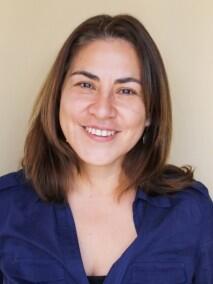
Karina Sarmiento
Ecuador
Karina Sarmiento is the regional director for Asylum Access Latin America, an international organization working to support refugee rights. Sarmiento leads the organization’s growth and implementation strategy for refugee legal aid clinics, strategic litigation, community legal empowerment and national policy advocacy in Ecuador, Panama and Mexico.
Sarmiento also heads Asylum Access’s regional policy that aims to incorporate refugee rights into political and human rights institutions across Latin America. Her work in refugee and human rights began in 2006, when she started working in northern Ecuador near the Colombian border. Sarmiento currently serves as a regional adviser for South America for the International Detention Coalition, a non-profit organization advocating for human rights for detained refugees, asylum seekers and migrants.
Sarmiento holds a bachelor’s degree in sociology and development studies from Sussex University, England, a masters of law in international and transnational criminal law from Teramo University, Italy, and a master’s degree in gender and development from the University of Barcelona, Spain.
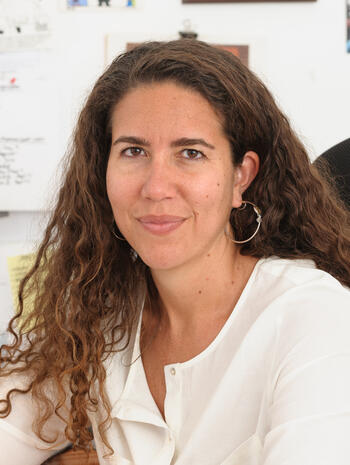
Heba Morayef
Egypt
Heba Morayef is an Egyptian human rights defender based in Cairo. As Human Rights Watch’s (HRW) Egypt director for six years, Morayef focused on documenting human rights violations, publicizing them, and lobbying decision-makers. She has led HRW’s domestic and international advocacy strategy on Egypt and regularly appeared in the media.
Recently, Morayef served as a senior Egypt analyst for the International Crisis Group until the authorities shut down the Cairo office. Until 2011, Morayef worked as a researcher on Libya for HRW. During that time she led two field missions to Libya in 2009, one of which included a visit to Abu Salim prison in Tripoli, a maximum security prison notorious for human rights abuses. Her prior experience also includes Amnesty International where she conducted country research on human rights in Libya and Tunisia. Morayef was named one of Foreign Policy’s 2013 Global Thinkers, was on the list for Forbes’ 12 Power Women to Watch in 2013, and was a 2013 Time 100 nominee.
She holds an LL.M. in public international law from the London School of Economics and a B.A. in political science from the American University in Cairo.

Giorgi Gogia
Georgia
Giorgi Gogia is a senior researcher for Human Rights Watch where he researches, monitors and documents human rights abuses in Armenia, Azerbaijan and Georgia. He has worked and written extensively on criminal justice system reform, police brutality, freedom of expression, media freedoms, property rights and international humanitarian law.
Gogia’s work on criminal justice reform in Georgia led to an amendment overhauling the government’s flawed system of administrative detention in 2014. He documented human rights and humanitarian law violations during the Georgia-Russia conflict over South Ossetia in 2008 and the rights of ethnic Georgians who returned to their homes in Abkhazia, another one of Georgia’s breakaway regions. Before joining Human Rights Watch, Gogia worked for the International Crisis Group as a senior analyst, researching and writing on protracted conflicts in the South Caucasus – Abkhazia, South Ossetia and Nagorno-Karabakh.
He holds an M.A. in political science from the Central European University, Budapest, Hungary, and a B.A. in international law and relations from Tbilisi State University, Georgia.

Mukul Saxena
India
Mukul Saxena is a colonel with the Indian Army who has 11 years of service in conflict regions of the country. He has commanded an infantry battalion at the Line of Control, a military line established between Pakistan and India located in the state of Kashmir. He is now commanding one of the ten most coveted territorial army battalions in the state – the Home and Hearth Battalion.
As a passionate human rights advocate, Saxena is working within the Indian army on human rights issues pertaining to children's rights in areas of civil unrest. He was a consultant for the National Commission for Protection of Child Rights (2007-12) where he was instrumental in drafting a national policy for law enforcement agencies engaging children in areas of unrest – the first document that has established procedures for the protection of children. Saxena has also conducted a study on substance abuse amongst children in the conflict areas of Northeast India. In 2013, he was asked to submit a report to the Government of India and presented his findings to the Planning Commission of India on the status of children in areas of civil unrest. Saxena was selected as a 2013 Chevening Gurukul Fellow at the London School of Economics and Political Science. As part of the U.K. Foreign and Commonwealth Office’s fellowship for Indian mid-career professionals with leadership potential, he submitted a paper titled, “Combating Terror Through Affirmative Action: Has the UK Response Towards Multiculturalism Succeeded?”
Saxena is a graduate of the National Defence Academy, India and obtained an LL.M. in international human rights law from the University of Essex, United Kingdom. He was a visiting fellow to the Child Advocacy Program at Harvard University.
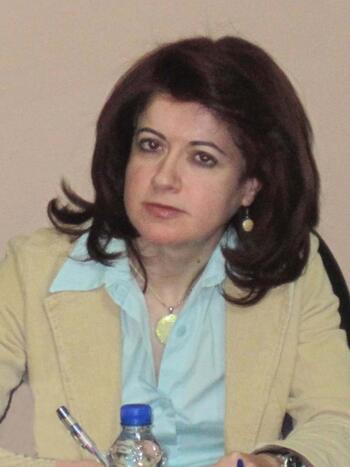
May Al-Taher
Jordan
May Al-Taher is a researcher and the founder of the Vision Institute for Civil Society Studies (VICSS), a policy research institute supporting rule of law reform in Jordan by leading civil society debates, developing policy briefs, and conducting specialized training and research.
Prior to founding VICSS in 2010, Al-Taher worked for the United Nations Office for Project Services as a lead consultant on local governance assessments in Iraq. In 2007, she managed the local observation team for Jordan’s parliamentary elections – the first time local observers were allowed to observe elections in Jordan. In 2003, Al-Taher worked on Jordan’s United Nations Development Program Human Development Report.
She holds a Ph.D. in economics and has several publications in English and Arabic.

Teddy Warria
Kenya
Teddy Warria is an entrepreneur and the CEO of Africa 2.0 Kenya, an action-oriented community of young and emerging leaders of African descent who share a collective vision for inclusive socio-economic growth in Africa. Warria is also the director of Africa’s Talking Ltd, a mobile telecommunications company working to close the information poverty gap in Kenya.
He is a special projects consultant to Makini Schools Ltd, a leading private educational institution that offers pre-school, primary and high school level quality education in Kenya. Warria serves on the boards of several community-centered organizations. He is a member of the Clinton Global Initiative and Aspen Global Leadership Network. He was in the inaugural class of Tutu’s Leadership for Change in Africa Program and in the present class of Africa Leadership Initiative’s East Africa Fellowship. Currently, he is the African Artists Peace Initiative Ambassador for Africa.
Warria is a regular contributor to The Edition, eastern Africa’s career magazine. He recently authored the mini-biography of Mama Sarah Hussein Obama, President Barack Obama’s grandmother.
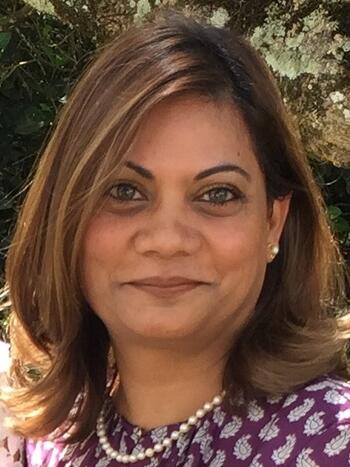
Roukaya Kasenally
Mauritius
Roukaya Kasenally is a senior advisor with the African Media Initiative (AMI), an organization supporting independent media on the continent. She manages a number of key programs including ethics and leadership, market intelligence research and capability skills for media professionals. Kasenally is also a senior lecturer in media and political systems at the University of Mauritius.
Prior to her role as senior advisor, she was the director of programs and knowledge management for AMI. Kasenally has served as a researcher and consultant for a number of pan-African democratic and governance institutions and co-founded an advocacy organization to engage the Mauritian public in democratic development. She has authored publications on media and democratic systems. Kasenally was awarded the Reagan–Fascell Democracy Fellowship (2010-11); the International Visitor Leadership Program’s Grassroots Democracy in Africa (2011); and the British Council’s Leadership: Trust the Difference Award (2009).
She holds a Ph.D. in broadcasting policy from the University of Sheffield, United Kingdom.

Oludotun Babayemi
Nigeria
Oludotun Babayemi is a monitoring and evaluation expert with experience developing technology enabled platforms to help monitor and track public resource allocation and increase communication channels between government and citizens. He is the co-founder of Connected Development [CODE], an organization that uses online and offline tools to put pressure on governments and organizations in Nigeria to be more accountable and transparent.
Babayemi is an Open Knowledge Foundation School of Data Fellow where he provides trainings to over 300 members of civil society on the use of data for advocacy, transparency and accountability. As a CrisisMapper Fellow for the United States Agency for International Development, he trains several NGOs and the government on the use of technology in various humanitarian emergencies. Previously Babayemi was the project director for World Wildlife Fund’s Earth Hour in Nigeria where he collaborated with government agencies, emergency services, and business and community leaders to drive community engagement. Babayemi received the United States President's Volunteer Service Award (2012) in recognition of his volunteer service during 2011 humanitarian emergencies in the U.S.
Babayemi holds a M.Sc. in information management from Ahmadu Bello University, Nigeria.

Okechukwu Nwanguma
Nigeria
Okechukwu Nwanguma is the national coordinator of the Network on Police Reform in Nigeria (NOPRIN) Foundation, a network of 46 civil society organizations committed to promoting police accountability and respect for human rights. He focuses on monitoring, documenting and denouncing abuse of human rights by police and other law enforcement agencies.
For nearly two decades, Nwanguma has been involved in efforts to reform and strengthen state institutions in Nigeria, particularly the criminal justice system. In 2012, Nwanguma was the civil society liaison for a panel on police reform established by NOPRIN in response to another ineffective police reform committee set up by the government. Between 2008 and 2011, Nwanguma organized public tribunals on police abuse in Nigeria to testify publicly before a panel of eminent Nigerians. For 18 years, Nwanguma worked for the Civil Liberties Organization in Nigeria monitoring, documenting and denouncing human rights abuses in the context of law enforcement.
Nwanguma was a Reagan-Fascell Democracy Fellow (2008) at the National Endowment for Democracy, Washington, D.C, where his research focused on police reform in Nigeria and civil society.
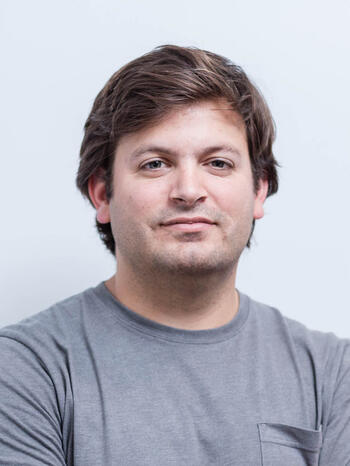
Bruno Defelippe
Paraguay
Bruno Defelippe is a social entrepreneur who has launched several social initiatives to engage young people to solve social and environmental challenges in Paraguay. He is the co-founder of Koga Social Business Lab, which incubates social businesses and provides a strong ecosystem for social entrepreneurs to thrive.
He is also the co-founder of Landia Housing Solutions which is recognized as one of the 10 best social businesses in Latin America for their approach to low-income housing. Prior to co-founding these social businesses, Defelippe was the CEO of Techo Paraguay where he oversaw the development of over 4,000 transitional homes and mobilized 20,000 volunteers.
Defelippe is involved with several networks such as the Global Shapers, an initiative of the World Economic Forum, Asociación de Jovenes Empresarios and the Club de Ejecutivos. He serves as a member of the advisory boards of local NGOs, including: Techo, Good Neighbors and Sumando.

Kornchanok Raksaseri
Thailand
Kornchanok Raksaseri is a journalist, educator and activist working on media reform to support Thailand’s democratic development. As the vice president of the Thai Journalists Association and the ASEAN Journalists Club, Raksaseri promotes professionalism of the media, freedom of the press and the welfare of journalists.
Raksaseri is the assistant executive editor overseeing foreign news for Econ News Newspaper, a monthly magazine based in Bangkok, Thailand. She is also a columnist for an English-language daily newspaper, The Nation, where she previously worked as a political news editor. She has been a guest lecturer at Suan Sunandha Rajabhat University, Thailand. Raksaseri was a participant of the 2010 Asia Journalism Fellowship in Singapore. Recently, she was one of 12 fellows selected to join the 2015 Asia Foundation Development Fellows: Emerging Leadership for Asia's Future program.
Raksaseri received her bachelor and master degrees in journalism from Chulalongkorn University, Thailand.
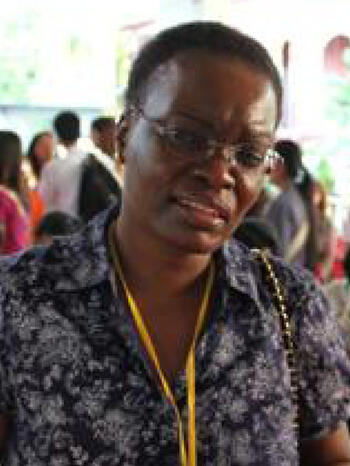
Irene Caroline Ovonji-Odida
Uganda
Irene Caroline Ovonji-Odida has dedicated 25 years of her career to advancing gender equality and justice as a policymaker, activist and legislator. She is the CEO of the Uganda Association of Women Lawyers, which works to use the law to advance human rights and social justice for women and children.
Ovonji-Odida serves as a member of the United Nations Economic Commission for Africa’s panel on illicit financial flows from Africa, chaired by former South African President Thabo Mbeki. She was elected to the East African Legislative Assembly (2001-06) where she spearheaded initiatives to increase transparency and accountability for marginalized constituencies and worked to increase the effective participation of African legislators in international trade negotiations. Previously Ovonji-Odida worked for the Directorate of Ethics and Integrity for the Ugandan Office of the President, the Uganda Law Reform and the Uganda Constituent Assembly Commission, which managed the 1995 constitution-making process in Uganda.
She holds a bachelor’s of law degree with honors from Makerere University, Uganda; a master’s degree in comparative jurisprudence specializing in international human rights from Howard University; and a diploma in legal practice. Her post-graduate training includes certificates in management and training in gender and development from the Royal Netherlands Institute.
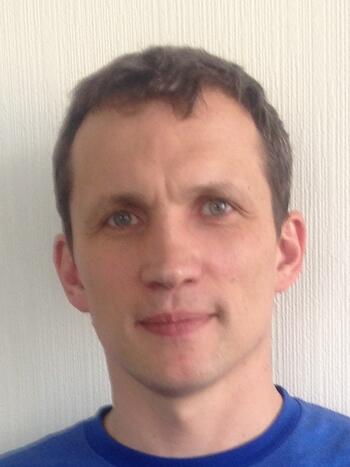
Maksym Savanevskyi
Ukraine
Maksym Savanevskyi is the editor-in-chief of Watcher, an online news platform that explores and analyzes the impact of digital communications on Ukrainian society and cyber security in the country. Savanevskyi is also the founder and managing partner of one of the largest digital communications agencies in Ukraine, PlusOne DA.
He co-founded the Ukraine Crisis Media Center in March 2014, which was set up in the aftermath of Russia’s annexation of Crimea. The Center provides objective information about developments in the country. Through these initiatives, Savanevskyi has consulted and advised a number of Ukrainian NGOs and political parties on how to maximize their use of new media, focusing primarily on how to actively interact with supporters via social media. His recent work includes a research study on the impact of social media on the Euromaidan protest movement.

Catherine Phiri
Zambia
Catherine Phiri is a public prosecutor for the government of Zambia where she prosecutes cases of corrupt practices, abuse of authority and money laundering that undermine the rule of law. Through her work with the National Prosecution Authority, she has helped implement systems that enhance the efficient and effective flow of cases.
Phiri heads a unit responsible for monitoring and offering advice to law enforcement agencies that investigate and prosecute financial crimes. She has participated in the prosecution of high profile cases. Her work also involves taking care of the welfare of witnesses to ensure that they are able to testify effectively in court.
In addition to a bachelor’s degree in law, Phiri has received a postgraduate diploma in legislative drafting from the Zambia Institute of Advanced Legal Education.
